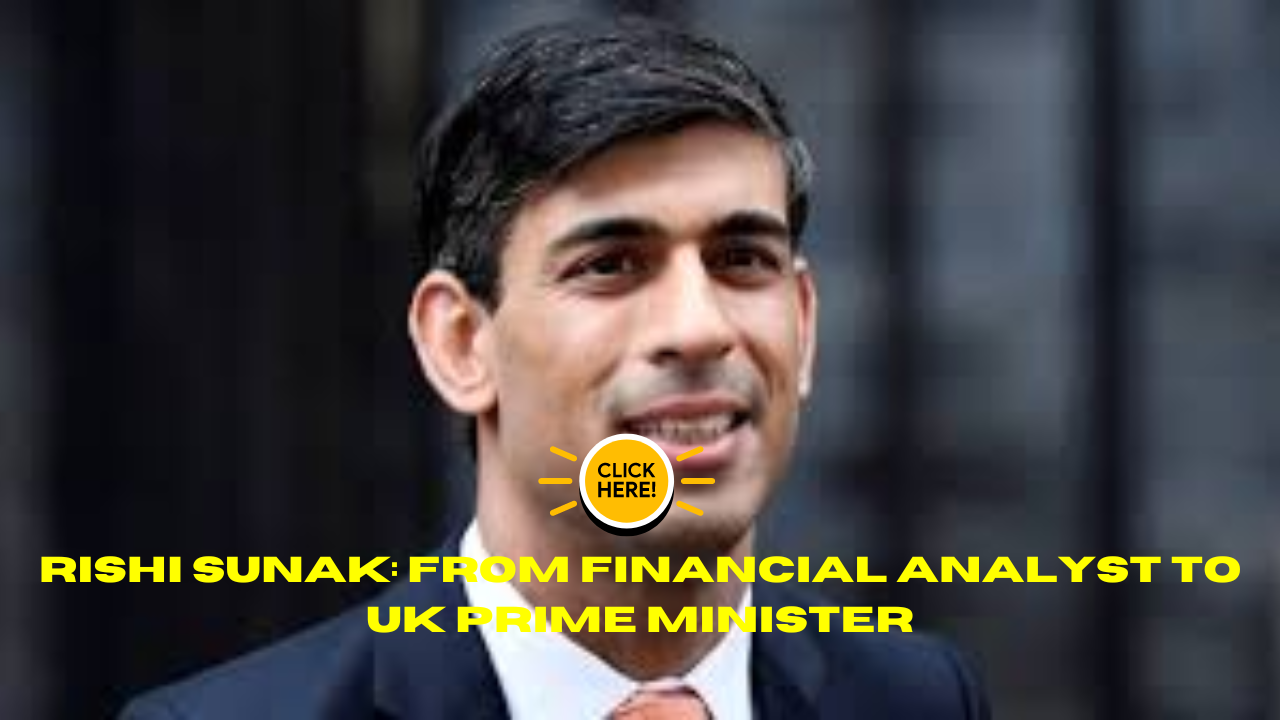Rishi Sunak: From Financial Analyst to UK Prime Minister
Early Life and Education
Rishi Sunak was born on May 12, 1980, in Southampton, England, to parents of Indian descent who immigrated from East Africa. His father was a general practitioner, and his mother ran a pharmacy. Sunak’s academic journey began at the prestigious Winchester College, followed by a degree in Philosophy, Politics, and Economics (PPE) from Lincoln College, Oxford. He later earned an MBA from Stanford University as a Fulbright Scholar, where he met his future wife, Akshata Murty, daughter of Infosys co-founder Narayana Murthy (Wikipedia) (Encyclopedia Britannica).
Career in Finance
Before entering politics, Sunak built a successful career in finance. He worked as an analyst at Goldman Sachs and later joined hedge funds like The Children’s Investment Fund Management and Theleme Partners, where he became a partner. His financial acumen and business success contributed significantly to his wealth, especially through his wife’s substantial stake in Infosys (Encyclopedia Britannica) (InfoPlease).
Political Ascent
Sunak’s political career began in earnest in 2015 when he was elected as the Member of Parliament for Richmond in North Yorkshire, a seat previously held by Conservative Party leader William Hague. He quickly rose through the ranks, serving as Parliamentary Under-Secretary of State for Local Government and later as Chief Secretary to the Treasury. His support for Brexit and free-market economics aligned him with prominent Conservative figures (Encyclopedia Britannica) (InfoPlease).
Chancellor of the Exchequer
In February 2020, Sunak was appointed Chancellor of the Exchequer by Prime Minister Boris Johnson. His tenure was marked by the COVID-19 pandemic, during which he implemented significant economic measures, including the Coronavirus Job Retention Scheme and the Eat Out to Help Out initiative, to mitigate the pandemic’s economic impact (Encyclopedia Britannica) (The Independent).
Prime Minister
Sunak’s rise to the top job was not straightforward. After the tumultuous resignation of Boris Johnson and the brief, rocky tenure of Liz Truss, Sunak became the leader of the Conservative Party and the Prime Minister on October 25, 2022. His appointment marked several historical firsts: he became the first person of color, the first person of Indian descent, and the first Hindu to hold the office of UK Prime Minister (Wikipedia) (InfoPlease).
Challenges and Future
Sunak’s premiership has been characterized by significant challenges, including the ongoing cost-of-living crisis, industrial disputes, and navigating the post-Brexit political landscape. His policies and leadership style continue to shape the Conservative Party’s direction and the UK’s future on the global stage (Wikipedia) (Encyclopedia Britannica).
Rishi Sunak’s journey from a finance professional to the Prime Minister of the United Kingdom is a testament to his resilience, strategic thinking, and ability to navigate complex political and economic landscapes. His story is one of notable achievements and significant challenges, reflecting the dynamic nature of contemporary British politics.
Q: Who is Rishi Sunak and why is he significant in British politics?
A: Rishi Sunak is a British politician who has served as the Prime Minister of the United Kingdom since October 25, 2022. Born on May 12, 1980, in Southampton, England, Sunak is a member of the Conservative Party. He is significant for his rapid rise in British politics, his role in managing the UK’s economy during the COVID-19 pandemic as Chancellor of the Exchequer, and his diverse professional background, which includes experience in finance and business.
Q: What is Rishi Sunak’s background before entering politics?
A: Rishi Sunak’s background before entering politics includes:
- Education: Sunak was educated at Winchester College, an independent boarding school, followed by studying Philosophy, Politics, and Economics (PPE) at Oxford University. He later earned an MBA from Stanford University as a Fulbright Scholar.
- Professional Career: Before his political career, Sunak worked as a financial analyst at Goldman Sachs and later joined hedge funds such as The Children’s Investment Fund Management and Theleme Partners. His experience in finance provided him with a solid understanding of economic and fiscal matters.
Q: How did Rishi Sunak enter politics and rise to prominence?
A: Rishi Sunak entered politics in 2015 when he was elected as the Member of Parliament (MP) for Richmond, Yorkshire, succeeding former Conservative leader William Hague. His rise to prominence includes:
- Early Roles: Sunak quickly gained recognition for his competence and leadership skills, holding positions such as Parliamentary Under-Secretary of State for Local Government and serving on the Environment, Food, and Rural Affairs Select Committee.
- Chancellor of the Exchequer: In February 2020, Sunak was appointed Chancellor of the Exchequer by Prime Minister Boris Johnson. His role in managing the UK’s economic response to the COVID-19 pandemic, including the introduction of the furlough scheme, significantly raised his profile and popularity.
Q: What were some major policies and actions taken by Rishi Sunak as Chancellor of the Exchequer?
A: Major policies and actions taken by Rishi Sunak as Chancellor of the Exchequer include:
- COVID-19 Economic Response: Sunak implemented the Coronavirus Job Retention Scheme (furlough scheme), which subsidized wages to protect jobs during the pandemic, and the Self-Employment Income Support Scheme.
- Economic Stimulus Packages: He introduced various stimulus packages to support businesses and individuals, including grants, loans, and tax deferrals.
- Public Spending and Budget: Sunak’s budgets focused on supporting the economy during the pandemic while also addressing long-term fiscal challenges, including significant public spending on healthcare and infrastructure.
Q: What led to Rishi Sunak becoming the Prime Minister of the UK?
A: Rishi Sunak became the Prime Minister of the UK following a series of political events:
- Resignation of Boris Johnson: In July 2022, Prime Minister Boris Johnson announced his resignation amid various controversies and a loss of confidence within his party.
- Leadership Contest: Sunak announced his candidacy for the Conservative Party leadership and, after a competitive contest, was elected as the leader of the Conservative Party.
- Appointment as Prime Minister: As the leader of the majority party in the House of Commons, Sunak was appointed Prime Minister by King Charles III on October 25, 2022.
Q: What challenges has Rishi Sunak faced since becoming Prime Minister?
A: Since becoming Prime Minister, Rishi Sunak has faced several challenges:
- Economic Stability: Managing the economic recovery post-COVID-19, dealing with high inflation, and addressing the cost-of-living crisis.
- Brexit Aftermath: Navigating the ongoing complexities and trade issues arising from Brexit, including Northern Ireland protocol adjustments.
- Political Unity: Unifying the Conservative Party and maintaining party cohesion following the turbulent leadership changes.
- Global Issues: Addressing international challenges such as geopolitical tensions, climate change, and the impacts of global economic instability.
Q: What are some key priorities and policies of Rishi Sunak’s government?
A: Key priorities and policies of Rishi Sunak’s government include:
- Economic Growth: Focusing on measures to stimulate economic growth, support businesses, and create jobs.
- Healthcare: Investing in the National Health Service (NHS) to improve healthcare services and address backlogs exacerbated by the pandemic.
- Education: Enhancing the education system to ensure high-quality education and skills development for the workforce.
- Environment: Committing to net-zero carbon emissions by 2050 and implementing policies to combat climate change.
- Social Welfare: Addressing social inequalities and improving the welfare system to support vulnerable populations.
Q: How has Rishi Sunak’s background in finance influenced his approach to governance?
A: Rishi Sunak’s background in finance has significantly influenced his approach to governance:
- Fiscal Responsibility: His experience in finance has instilled a strong focus on fiscal responsibility and managing public finances prudently.
- Economic Policies: Sunak applies analytical and data-driven approaches to economic policies, aiming to balance short-term relief with long-term sustainability.
- Problem-Solving: His financial background equips him with strategic problem-solving skills, particularly in handling economic crises and complex fiscal challenges.
Q: What impact has Rishi Sunak had on the Conservative Party and UK politics?
A: Rishi Sunak has had a considerable impact on the Conservative Party and UK politics:
- Modernizing Influence: Sunak represents a new generation of Conservative leaders, bringing a modern, pragmatic approach to governance.
- Party Unity: He has worked to unite the party after a period of internal divisions and leadership turmoil.
- Policy Direction: Sunak’s policies and priorities reflect a blend of traditional Conservative values with contemporary issues, such as economic reform, environmental sustainability, and social welfare improvements.
- Public Perception: His leadership during the pandemic and his rise to Prime Minister have shaped public perception of the Conservative Party, highlighting its capacity for renewal and resilience.



PM Viksit Bharat Rojgar Yojana - SugerMint.in
[…] Prime Minister also highlighted complementary initiatives such as the Lakhpati Didi Yojana for women empowerment […]